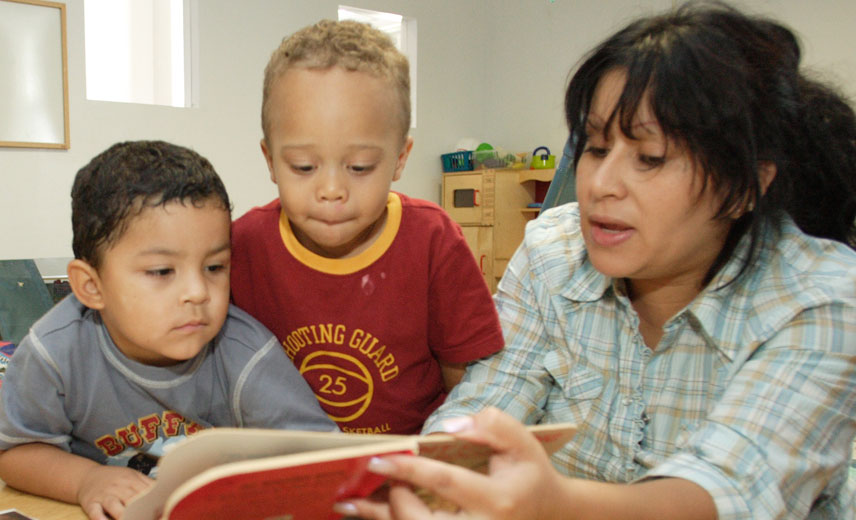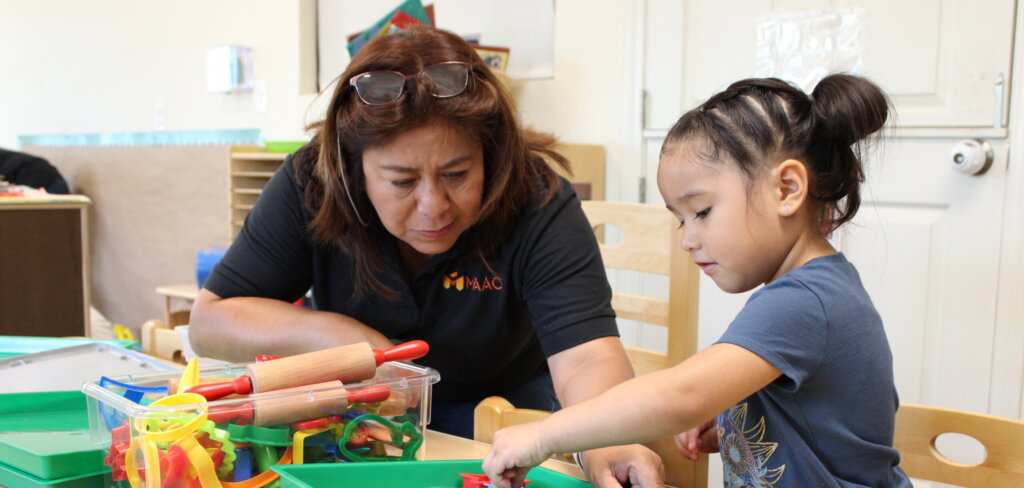Fight Continues Against AZ’s English-only Law
UnidosUS began National Bilingual/Multilingual Learner Advocacy Month in April requesting that the Arizona Board of Education address the adverse implications of the current attacks on English Language Learners.
–Author Julienne Gage is a former UnidosUS staff member and longtime contributor to the Progress Report blog.
April 30 marked the end of National Bilingual/Multilingual Learner Advocacy Month, but UnidosUS’s longstanding efforts to celebrate the power of multilingualism continue, as does its fight against Arizona’s Proposition 203 (Prop. 203), the sole English-only law in the nation that is still standing. The organization stands firm in its belief that this policy is detrimental, reinforcing racial inequities and hindering both students and the broader Arizona community.
The state of Arizona has over 1.1 million students, 107 thousand of which speak a language other than English at home, and of those, 86.2% are Latino, according to data from the Arizona State Board of Education.
On April 4, UnidosUS sent a letter to the Arizona State Board of Educators asking that the board denounce Superintendent of Public Instruction Tom Horne’s yearlong efforts to obstruct multilingual learners (MLLs) in Arizona from accessing state-approved bilingual education programs, such as the 50-50 Dual-Language Immersion (DLI) model. Horne claims that, unlike their English-speaking peers, MLLs must be segregated from other students to learn in structured English immersion programs unless they have a burdensome waiver.
UnidosUS has found that since getting re-elected to the position in 2022, Horne has continuously attacked the educational opportunities of multilingual learners in Arizona, including orchestrating lawsuits alleging that dual-language programs, such as the 50-50 model, violate Prop. 203’s English-only mandate.
“We are steadfast in our belief that educational policies should uplift every student, irrespective of their linguistic or cultural heritage,” the letter stated. “Prop 203 has proven detrimental to English Learners (ELs), limiting their English proficiency and widening academic disparities with their non-EL counterparts.”
UnidosUS has been calling out Prop. 203 since its enactment in 2000. In 2019, it led a near-successful bipartisan campaign to end it in the Arizona state legislature, which unanimously approved a bill to ease restrictions by reducing the mandatory four-hours of daily English immersion to two hours. It also put the Arizona State Board of Education in charge of identifying research-based English-instruction models for MLLs. The Arizona State Board of Education went on to approve four such models, including the 50-50 DLI one.
The issue reached a critical point in June 2023 when Horne threatened to cut English teaching funds to any schools using a DLI model, calling it unlawful and arguing that parents can sue to remove school board members or administrators who use it.
Doubling down on his unjustified attacks on the educational opportunities of multilingual learners in Arizona, Horne said, “I want to emphasize that these rules only apply to students who have not yet attained proficiency in English…I personally have studied six languages. Knowing multiple languages is beneficial and develops the brain in ways that help learn other subjects.”
Attorney General Kris Mayes quickly refuted Horne’s threats, explaining that Horne was exercising authority outside his powers and that only the Arizona State School Board can decide if a school district isn’t complying with the law.
“The Board has sole statutory authority to delete or modify an SEI (Structured English Immersion) model,” the AG wrote in a formal opinion that came in response to a request from Democratic legislators. “Neither the Department nor the Superintendent has statutory authority to reject an SEI model approved by the Board or to declare its illegality. Nor does the Superintendent or the Department have authority to withhold monies from school districts or otherwise impose consequences on schools for utilizing the Dual Language Model.”
In spite of that, on September 6, 2023, Horne filed a lawsuit with the Supreme Court of Maricopa County, where there is a high population of EL students. The lawsuit named Hayes, Governor Katie Hobbs, and the Creighton School District east of Phoenix as defendants.
While the judge was reviewing the case, the Arizona State Board of Education and Attorney General Hayes stated their commitment to upholding the revised guidelines for dual-language programs and reaffirmed their support for educational flexibility.
Meanwhile, UnidosUS, in partnership with caretakers, educators, community-based organizations, and national bilingual education research and advocacy groups ramped up its advocacy for dual-language learning, touting bilingualism as a superpower that makes students better problem solvers and critical thinkers with strong social, and emotional and multicultural competencies, all of which can lead to a more competitive workforce and a compassionate society in an increasingly diverse nation and an interconnected world.
Many of those groups, including Aliento, All In Education, Arizona Community Foundation, Arizona Hispanic Chamber of Commerce, CPLC AF, Children’s Action Alliance, Stand for Children, Living United for Change in Arizona (LUCHA), ONE Community, and Save Our Schools Arizona, also signed the April 4 letter.
On March 8, the court issued a legal opinion stating that Horne was not in a position to act on his claims.
“Simply put, no Arizona statute grants the Superintendent an open-ended general grant of authority to sue,” Maricopa County Superior Court Judge Katherine Cooper wrote in her 14-page ruling.
But Horne remained defiant, stating: “The districts that opposed our position will regret this development. A near identical action will be filed by a parent, and this will have much worse consequences for the districts.”
True to his word, a few days later, Horne recruited a parent whose child attends school in the city of Scottsdale to file a lawsuit against the Creighton School District 10 miles away.
“The day has come,” said Horne, whose wife, attorney Carmen Chenal Horne, represented the parent in the filing.
UnidosUS believes this latest lawsuit is symbolic of Horne’s desperation to make an unfounded and ill-intended case against multilingual programming. Rather than seeking to hold ELs back further, Superintendent Horne should focus on addressing pressing issues like academic recovery and the teacher shortage crisis so that students have the support and resources they need to succeed.
“These actions disregard the proven benefits of this model and would deprive Latino students, which make up a significant portion of EL students in Arizona, and other MLLs across the state of equitable access to high-quality education and opportunities,” the April 4 letter stated, noting that “with a substantial body of evidence pointing to [Prop. 203’s] limitations, there is a pressing need for Arizona to transition towards comprehensive, research-endorsed instructional approaches.”
The importance of advocacy
Strict English-only education policies came into effect in Arizona, California, Colorado, and Massachusetts during the late 1990s and 2000s, just as the United States was seeing major growth in student diversity, especially among English learners. Through research and advocacy in the Latino community and beyond, UnidosUS has contributed to the successful repeal of these policies in all states but Arizona.
The Every Student Succeeds Act (ESSA) of 2015, the latest legislation guaranteeing an equal right to U.S. education in the U.S. school system, requires states to identify and provide targeted, comprehensive support for low-performing schools. A 2020 UnidosUS fact sheet noted that, on average, Arizona’s F-rated schools had a 63% Latino student population, while the Latino population in A-rated schools was just 27%.
UnidosUS and its partners have found that DLI programs are effective in helping students learn English while developing fluency in another language and that DLI programs lead to higher academic outcomes in both languages. For example, a 2020 UnidosUS fact sheet showed that, by 2013, with more than a decade of English-only Prop. 203 programming in place throughout Arizona, less than 8% of ELs in the state school system had met basic or above level reading in the fourth grade.
Ironically, Horne has not required students who speak English as a first language to obtain a waiver for participating in DLI programs.
“We ardently believe that Arizona’s children deserve an education that acknowledges and elevates their diverse backgrounds, preparing them for a multicultural and global tomorrow,” the letter stated in its conclusion. “We urge the Board to solidify its dedication to this vision by endorsing dual-language programs and shunning policies that disadvantage our future leaders.”
UnidosUS plans to continue working alongside Affiliates, partners, caretakers, and other stakeholders to advocate for and implement policies that better serve the needs of MLLs and all students in Arizona and prepare them to be part of a global society and not an isolated one.
“We believe in the power of collaborative efforts to create an educational environment where we celebrate diversity and afford every student the chance to succeed,” the letter stated.




